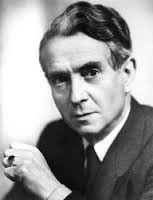Herbert Howells' Requiem
 Herbert Howells (1892-1983) is one of my favorite English composers, up there with Tallis, Byrd, and Purcell. Though quintessentially a composer of his time and place, specializing in the same genres as his colleagues during the late-nineteenth century and into the first half of the twentieth, he is, for me, very special, very individual: in his text setting and harmonic language; in the manner in which he builds and releases tension; and in the very heartfelt and authentic way these elements of his style express profound emotion while avoiding the formulas and conventions of his contemporaries—those aspects of this music we so easily and comfortably identify as “English.”
The compositional and performance history of his Requiem for a cappella choir (which Chorale will present in June) has been somewhat shrouded in mystery—a mystery which has contributed to a mythology about Howells, and his work, which recent, well-documented scholarship has not entirely corrected. A major pillar of that mythology states that Howells composed the Requiem in response to the death of his son Michael, at the age of nine, in 1935. We now know that the work was composed in 1932 or 1933, long before Michael’s death, and was intended for the choir of King’s College, Cambridge. For some reason, the score was never sent to King’s, and remained unknown until its publication in 1980, only three years before the composer’s own death. Howells himself came to associate the work with his son, and used major portions of it in his subsequent major work, Hymnus Paradisi, for chorus, soloists, and orchestra, a composition intended as his son’s memorial. I read that this larger work is considered the composer’s masterpiece, and have listened to it, and studied the score—and do not find that it has the power, the immediacy, of the original, a cappella composition. I can only be grateful that someone, perhaps Howells himself, realized that the smaller work had a unique beauty, and brought it to the public, rather than archiving it as a sketch.
Herbert Howells (1892-1983) is one of my favorite English composers, up there with Tallis, Byrd, and Purcell. Though quintessentially a composer of his time and place, specializing in the same genres as his colleagues during the late-nineteenth century and into the first half of the twentieth, he is, for me, very special, very individual: in his text setting and harmonic language; in the manner in which he builds and releases tension; and in the very heartfelt and authentic way these elements of his style express profound emotion while avoiding the formulas and conventions of his contemporaries—those aspects of this music we so easily and comfortably identify as “English.”
The compositional and performance history of his Requiem for a cappella choir (which Chorale will present in June) has been somewhat shrouded in mystery—a mystery which has contributed to a mythology about Howells, and his work, which recent, well-documented scholarship has not entirely corrected. A major pillar of that mythology states that Howells composed the Requiem in response to the death of his son Michael, at the age of nine, in 1935. We now know that the work was composed in 1932 or 1933, long before Michael’s death, and was intended for the choir of King’s College, Cambridge. For some reason, the score was never sent to King’s, and remained unknown until its publication in 1980, only three years before the composer’s own death. Howells himself came to associate the work with his son, and used major portions of it in his subsequent major work, Hymnus Paradisi, for chorus, soloists, and orchestra, a composition intended as his son’s memorial. I read that this larger work is considered the composer’s masterpiece, and have listened to it, and studied the score—and do not find that it has the power, the immediacy, of the original, a cappella composition. I can only be grateful that someone, perhaps Howells himself, realized that the smaller work had a unique beauty, and brought it to the public, rather than archiving it as a sketch.
John Bawden writes, “Howells’ music is much more complex than other choral music of the period, most of which still followed in the Austro-German tradition that had dominated English music for two centuries. Long, unfolding melodies are seamlessly woven into the overall textures; the harmonic language is modal, chromatic, often dissonant and deliberately ambiguous. The overall style is free-flowing, impassioned and impressionistic, all of which gives Howells’ music a distinctive visionary quality.
“The Requiem is written for unaccompanied chorus, which in places divides into double choir. There are six short movements which are organised in a carefully balanced structure. The two outer movements frame two settings of the Latin ‘Requiem aeternam’ and two psalm-settings. Howells reserves his most complex music for the Latin movements, in which he uses poly-tonality, chord-clusters and the simultaneous use of major and minor keys. In contrast, the psalm-settings are simple and direct, the speech-rhythms of the plain chordal writing arising out of the textual inflections.”
I came late to the Requiem. Although it became available to the public in 1980, and choral aficionados throughout the world rapidly became aware of it, I never even heard of it, never listened to a recording of it, until I began rehearsing it with Robert Shaw, in June 1998. Imagine my surprise, my pleasure, my total wonderment, as it unfolded before my eyes and ears. There is no choral work of the last 100 years that I like more. The performance ahead of us will mark the fifth time I have prepared it; the fact that I so eagerly return to it, is the best recommendation I can give it. If you do not know the work—prepare to be bowled over. No one expresses grief, and hope, better than Howells.
